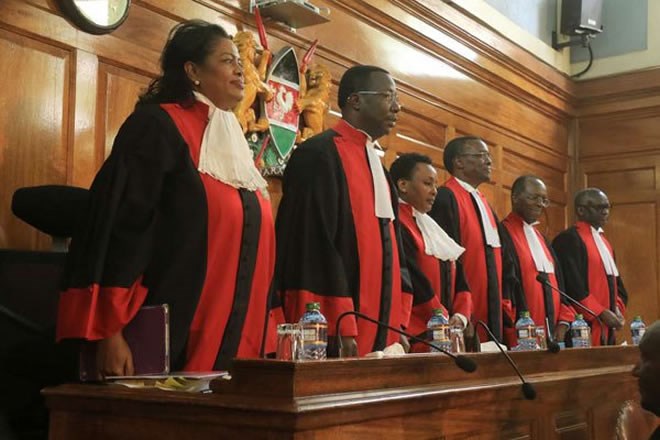
Thursday August 31, 2017
By SAM KIPLAGAT
 Supreme Court justices line up on Tuesday. Mr Raila Odinga, declared
loser of the August 8 election by the electoral commission, is
challenging the re-election of President Uhuru Kenyatta. A ruling is
expected to be read in Nairobi on Friday. PHOTO | JEFF ANGOTE | NATION
MEDIA GROUP
Supreme Court justices line up on Tuesday. Mr Raila Odinga, declared
loser of the August 8 election by the electoral commission, is
challenging the re-election of President Uhuru Kenyatta. A ruling is
expected to be read in Nairobi on Friday. PHOTO | JEFF ANGOTE | NATION
MEDIA GROUP
Supreme Court judges, assisted by an army of 40 aides, are wading through 70,000 pages of evidence on top of weighing oral arguments made by various lawyers in court to determine if President Uhuru Kenyatta was validly re-elected.
The seven judges have until Friday to decide the petition filed by the loser in the August 8 election, Mr Raila Odinga, and write a lengthy judgment.
Addressing lawyers on Tuesday night after the marathon two-day hearing, Chief Justice David Maraga said the judges did not have the luxury of time because the hard task of writing their decision begins.
“You people are going to sleep, we do not have that luxury,” Mr Maraga told the lawyers for the parties and observers after all the submissions had been concluded. “Once again, we want to thank you very much.”
Deputy Chief Justice Philomena Mwilu had also indicated during the pre-trial conference that the court did not want to be accused of writing a two-minute judgment.
SHORT RULING
During a similar petition in 2013, judges of the court, led by then Chief Justice Willy Mutunga, read a short ruling in open court before leaving the courtroom.
Dr Mutunga explained that they were dismissing the case but would give the complete judgment later. Many people expressed their disappointment in the move.
The process of writing the judgment is not easy. A mountain of documents were submitted by parties, so the judges will have to pore through these documents and read the notes they took in court during submissions before embarking on the arduous task of writing their decision.
A team of about 40 people has been assisting the judges carry out a number of duties, since the petition was filed on August 18.
Immediately the petition was filed, Justice Maraga mobilised about 18 legal researchers, 15 secretaries and three information technology experts to assist the court with the finer details of the complex issues that formed the core of the petition, and which will form the basis of the judgment.
SUPREME COURT
Normally, Supreme Court judges are assigned two legal researchers, but because of the strict timelines, the team was increased to four research assistants for each of the seven judges. Some of the researchers were reassigned from other courts, especially the Court of Appeal.
Among those assisting Justice Maraga to decipher the complex issues of the transmission of results as well as the contents of IEBC servers and its public portal, which are at the core of this dispute, are an IT expert and a foreign university professor.
The team of researchers is divided into various thematic areas that include the introduction, history, issues raised in the petition, and the law.
These researchers come up with a report on each area which is given to the respective judge.
After the teams complete this work, it is condensed into one document and shared among all the seven judges, who then retreat to their chambers and dictate to the secretaries whatever additional information they have.
THEMATIC AREAS
The judges could decide to share the task of writing the judgment according to same issues or thematic areas, so that one judge writes about ICT, another about the alleged abuse of office and how it affected the outcome of the poll, the security features of results forms, security of ballot papers, and so on. All these reports will be circulated among the judges for comments and additions.
During the last petition, after the judges had condensed their decision into judgment, they handed it to Justice Jackton Boma Ojwang’ to do the editing and firming. It is not clear whether he will do it this time.
Depending on the length of the judgment, which could run into tens of pages, the judges might read it in turn, with Chief Justice Maraga concluding and delivering the final orders of the court.
Another source said that owing to the many IT issues raised by the petition, the court asked for assistance from the Communications Authority of Kenya.